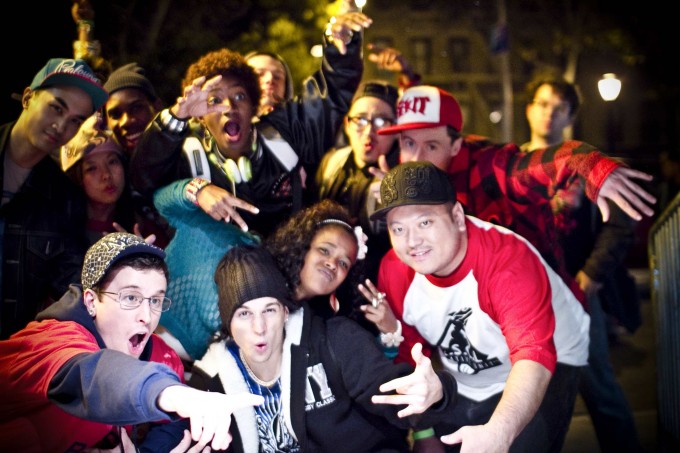CineVue had the pleasure to catch up with rising talent Jess dela Merced to talk about her upcoming short film – HYPEBEASTS, which she wrote, directed, and co-starred. It is a dramedy that casts an unrelenting eye on the uncomfortable issues of racism, consumerism, and capitalism in America. Her short film BLEACHED, was screened at the 2012 Asian American International Film Festival.
[vimeo]http://vimeo.com/52602738[/vimeo]
CineVue: How did you come up with the concept of HYPEBEASTS?
Jessica dela Merced: I knew I wanted to address the rise in racism towards Asian-Americans, but I didn’t know the most effective way. Around this time, I had heard about two Asian students at my alma mater, UC Irvine in Southern California, who went to a Chick Fil-A, where a cashier had written CHING and CHONG on their receipts. This pretty much started the gears, and as I did more research, I found out this wasn’t a unique occurrence. These sneaky and passive-agressive comments go unchecked so often, it’s disturbing. As I was searching for the world to place my story, the sneaker riot that erupted in Florida over the Nike Galaxy Foamposites happened. It just clicked. I needed to set my film in a volatile world, and a sneaker line could be exactly that.
[vimeo]http://vimeo.com/17138437#[/vimeo]
CV: In both BLEACHED and HYPEBEASTS, you explore racial identity particularly with youth; can you talk more about the intersection of these cultures?
JDM: As a first generation Asian-American, I’m very conscious of how I fit in America. It’s like being cursed with an ever present awareness- am I Asian enough, am I American enough, how much of each should I be before I am accepted? I know many minorities struggle with this today, and I wanted to express this feeling. In both films, my main characters are finding their footing as both Asians and Americans, and they deal with the backlash of being both. I feel that HYPEBEASTS is even more powerful because it explores this with different minorities, not just Asian-Americans. A sneaker line is an accurate representation of American youth- many microcosms of cultures co-existing in one space.

SNEAKERHEADS (On the set of HYPEBEASTS) played by – TOP ROW (L to R): Ronald Jimenea, Judy Lei, John Richards-Perry, Urena Washington, Francisco Isaiah Perez, Christopher Lee, Conall Jones, BOTTOM BOW (L to R): Stephen James Anthony, Daria Hunter, and Andrew.
CV: In HYPEBEASTS, there is tension between the Asian American and African American community. Does this ring true in real life? If so, how?
JDM: My main goal was to expose the sad truth of minorities pitted against each other. Inter-ethnic tension exists all over America. Racism still exists but the rules have changed. It’s no longer only whites vs. blacks. I could have picked any two minorities for this film, but after doing research, I found out there has been a significant rise in racist incidents against Asian-Americans by African-Americans. In many cases it is a violent type, but mostly it is hidden in the guise of economic misfortune and ignorance. It goes back to the model minority myth that Asians are a wealthy, but meek, mild-mannered, and unassuming race; and some use this as a justification to target them. Of course, racism is is a two-way street and HYPEBEASTS dissects this notion–every character in my film is flawed, no one is completely innocent. I believe this was the strongest choice I made, providing a more accurate depiction of Americans today. I make specific choices and do not generalize–the kids in my film say the things they say and do the things they do because of how they were conditioned: their friends, peer-pressure, society, etc.

CV: We noticed you’re an actor, writer, and director. Which is your favorite? And are you planning to pursue all three as you move on with your filmmaking career?
JDM: I grew up wanting to be an actor/comedian, but it just seemed all the odds were against me. My father believed that because there were barely any Asian-American actors on TV, let alone Filipino women. I had no chance. It motivated, and still motivates me to change this. Of course it has been hard–there haven’t been many roles for Asian-Americans–this is a fact. So I decided I needed to create respectable roles for myself and soon delved into filmmaking in college to do just that. I began to realize directing was something I could be good at, and now I enjoy it as much as I do acting. Writing’s a bit challenging for me, but I’m trying to push myself to get better. I definitely want to pursue all three for the rest of my life.
CV: What is your goal as a filmmaker?
JDM: When I made the decision to devote my life to this craft, it was because I was sick of not seeing Asians or Asian American stories onscreen. This is not to say I will only make Asian-American films, but I felt it was my obligation to at least change the norm. I wanted to make films that I wanted to watch, about people I could identify with. And I know others want this just as much as I do. There is a demand for it, but it is being neglected. Also, I want to bring strong female characters to the forefront. The world could use more heroine stories.
CV: If you can give one piece of advice for aspiring filmmakers and artists, what would it be?
JDM: Dreaming and talking about creating something can only get you so far in life. It takes courage and guts to actually make something; so be strong, don’t waste time, and go do it. You owe it to yourself. No one else is going to do it for you.
San Francisco native Jess dela Merced is completing an MFA from the New York University Graduate Film Program where she most recently received the 2012 Spike Lee Fellowship as well as the Lorraine Hansberry Arts, Performance, and Media Award. Last year she was selected for a unique writing internship created by Chris Rock at Comedy Central. Her latest film BLEACHED has won the Comcast Short Film Award at the CFAFF, the Best Narrative Short at the DC APA Film Festival, Honorable Mention for Best Short and Best Actress from the Asians on Film Festival, and has been selected for over a dozen other festivals. She wrote HYPEBEASTS in her independent study with Spike Lee and is excited to make it her thesis film.
They are currently fundraising for post-production. To help them complete their film, donate here.


